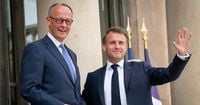Friedrich Merz, the newly elected Chancellor of Germany, embarked on his first official trip abroad on May 7, 2025, visiting Paris and Warsaw in a bid to rekindle strained relations with these key European partners. Following a tumultuous election that required a second round of voting, Merz’s leadership has been marked by political fragility, raising concerns about his capacity to navigate the complexities of European politics.
During a joint press conference with French President Emmanuel Macron, Merz expressed his commitment to strengthening the Franco-German relationship, which he described as essential for the future of Europe. "We wish to systematically build our actions together. We want to respond together to the challenges that Europe faces," Macron stated, emphasizing the need to rejuvenate the Franco-German reflex that has historically driven European integration.
Macron congratulated Merz on his election, which took place on May 6, 2025, and expressed optimism about a stronger Franco-German engine for Europe. He highlighted the importance of cooperation in addressing issues such as security, sovereignty, and competitiveness. The leaders announced the establishment of a joint defense and security council aimed at providing operational responses to common strategic challenges. This council is expected to meet regularly to coordinate defense efforts and enhance military collaboration between the two nations.
Despite the optimism surrounding Merz’s visit, the backdrop of his election raises alarms. The chaotic nature of the election, which was expected to be a formality, exposed the vulnerabilities of the conservative leader and the coalition he leads with the Social Democrats. Claire Demesmay, an associate researcher at the Marc Bloch Center in Berlin, remarked, "Until now, he had conveyed the image of a united, strong, and effective government. However, this undermines that message and clouds the image of Germany's return to the European stage."
Merz's visit to Paris is part of a broader strategy to reaffirm Germany's role in Europe after years of stagnation under former Chancellor Olaf Scholz. He is also scheduled to visit Brussels on May 9, 2025, as part of his diplomatic outreach.
In his remarks, Merz described himself as a "very European chancellor," signaling his intent to prioritize European unity and cooperation. He aims to bolster ties not only with France but also with Poland, particularly within the framework of the Weimar Triangle—a trilateral cooperation forum established in 1991 between France, Germany, and Poland.
However, the relationship with Poland is fraught with complications. The Polish government, led by Prime Minister Donald Tusk, is cautious about appearing too close to Germany, especially ahead of the Polish presidential elections on May 18, 2025. The nationalist opposition party, Law and Justice (PiS), continues to demand reparations from Germany for World War II damages, a sensitive topic that could complicate diplomatic efforts.
On defense matters, Merz has expressed openness to discussions about placing Germany under the nuclear umbrella of France and the United Kingdom, a significant shift from Germany's traditional reliance on American nuclear protection. This move reflects a broader reevaluation of security policies in response to perceived threats from Russia and the changing geopolitical landscape.
Macron and Merz also discussed the ongoing conflict in Ukraine, reiterating their commitment to work closely with international partners, including the United States, to achieve a ceasefire. Both leaders emphasized the need for a robust peace process supported by military commitments from the U.S. to ensure stability in Europe.
As they aim to enhance military cooperation, the leaders face challenges, particularly regarding the differing stances on economic policies and trade agreements. Merz has called for the rapid ratification of a free trade agreement with the Mercosur countries (Argentina, Brazil, Uruguay, Paraguay), which faces opposition from France due to agricultural concerns.
The two leaders also addressed the need for a unified European approach to energy and defense, with Macron advocating for an end to discrimination against low-carbon energy sources, including nuclear and renewables. They plan to accelerate the creation of a true savings and investment union within Europe to better mobilize resources for strategic objectives.
Despite the shared goals, significant differences remain between the three nations involved in the Weimar Triangle, particularly regarding military spending and debt policies. While Berlin has eased its debt brake rule to allow for increased military expenditures, it remains resistant to the euro-bonds proposed by France.
As Merz continues his diplomatic tour, the political landscape in Germany and Europe remains uncertain. His ability to foster cooperation and navigate the complexities of European politics will be closely scrutinized in the coming months, particularly as he seeks to strengthen Germany's position on the continent.
The challenges ahead are formidable, but for Merz, the opportunity to reshape Germany's role in Europe is also a chance to redefine the future of Franco-German relations and European unity.


